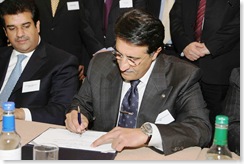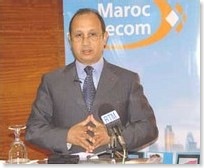The launch of Atheeb’s WiMAX network across Saudi Arabia as the second fixed-line provider is “imminent”, Atheeb’s vice president of information technology, Craig Humphreys, told Comm. today.
 Speaking on the sidelines of the TM Forum in Dubai, Humphreys confirmed that Atheeb has been commercially registered, and will launch voice and data services under the brand name of ‘Go’. He would not state how many customers Atheeb is targeting, however, he did assert the company has “lofty ambitions”.
Speaking on the sidelines of the TM Forum in Dubai, Humphreys confirmed that Atheeb has been commercially registered, and will launch voice and data services under the brand name of ‘Go’. He would not state how many customers Atheeb is targeting, however, he did assert the company has “lofty ambitions”.
“We aim to serve all our customers within three minutes. From the moment they are in a retail store and decide to purchase, to the moment they leave the premises, the whole process will take three minutes,” Humphreys commented.
Motorola will provide the WiMAX infrastructure, Wipro has been contracted as the systems integrator, and Chinese vendor ZTE will provide the IP multimedia subsystem (IMS) and multi-protocol label switching (MPLS) solutions.
Atheeb gained its fixed-line licence at the same time as Optical Communications headed by the US’s Verizon, and the Al-Mutakamilah Company, led by Hong Kong’s PCCW. Humphrey’s said Atheeb is far ahead of the other licensees, as neither have done an initial public offering (IPO) or been commercially registered yet.
Atheeb’s IPO took place last month and was oversubscribed by more than 350 per cent. The total number of offer shares subscribed reached 106,180,300, with total proceeds reaching SAR1.062 billion (US$283.5 million), by 1.3 million applicants.
Atheeb will compete with incumbent STC, which has approximately 4.5 million fixed-line subscribers and 1.3 million Internet users, representing penetration rates of 18.75 per cent and 5.4 per cent respectively.







